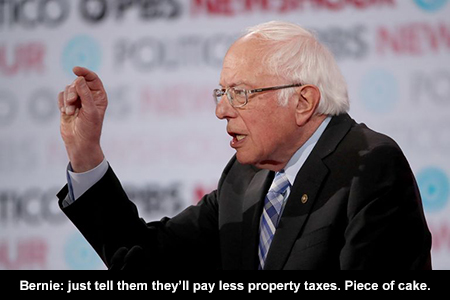I should start this post with the standard disclaimer that I am not an economist. Inasmuch as this is a nominally free country, at present, I am going to opine on one of the central issues in the Democratic primary debate – the idea of instituting a wealth tax. Advocated in some form by both Bernie Sanders and Elizabeth Warren, taxing wealth is not a new idea by any means. Chris Hayes’s recent conversation with Gabriel Zucman gives a really good overview of the question, so if you want to hear someone knowledgeable discuss the merits of instituting a wealth tax in the United States, by all means give that a listen. For now, here’s my once-over-lightly. right in time for the holiday season.
First, while this idea is remarkably popular, there is a lot of howling on the part of articulate opinion over it. If I were to guess, I would say that the reason may be simply that virtually everyone you see on television has some magnitude of wealth in the form of stocks, property, etc. in excess of what Warren or Sanders would deem taxable in their proposals. The reasons they typically give, though, are the standard capitalist tropes about stifling innovation, misdirecting funds to inefficient government programs, etc., etc. There is honestly no credible evidence to substantiate this claim, but even if some version of it were true, the revenue generated by such a tax would be more than worth the cost of inspiring some caution on the part of the billionaire class. Also, I think it’s important to fully understand what being a billionaire means. Having billions of dollars is not merely being wealthy; billions are about power, and I don’t mean purchasing power. I think there’s a strong argument to be made for putting a cap on wealth simply to constrain unaccountable power and influence on the part of billionaires, but that’s another conversation.

Zucman, a recognized authority on income and wealth inequality, points out that in America we already have a form of wealth tax, and it’s one that most potential readers of this blog (or any other blog, for that matter) are directly affected by: property taxes. For decades, home ownership has represented far and away the principal form of wealth held by ordinary (i.e. non-rich) people in the United States. I suspect it’s no accident that homes are taxed in a remarkably regressive way – specifically, not indexed to income in any way. Also, as Zucman points out, the property taxes we pay (either directly or indirectly as renters) are at the same level regardless of whether the owner holds a mortgage or not. So you may have less than 40% equity in your home, shell out half of your income on your mortgage, but still pay taxes on the full assessed value of that property. (I don’t know about other states, but here in New York, you can roll your taxes into your mortgage payment for added convenience. How thoughtful!)
A true wealth tax, on the other hand, would consider all forms of wealth, not just this narrow category that disproportionately impacts workers. It would be progressive – the less you own or earn, the less you pay – and a hell of a lot more fair than our current property tax system. So don’t buy the hype, people. As with our health care system, we are already doing it … we’re just doing it wrong.
luv u,
jp
